telegraphic codes and message practice
scanned code directory
mining codes
See also a separate page devoted to the codes of Frederic George McCutcheon; McCutcheon partnered with Moreing on several codes in the late 1890s and in the earlies
of the last century. This page may include discussions of codes that are not available as scans, but that I either have or have good information about.
1888 C. Algernon Moreing. Telegraphic Mining Code
1890 Stevens, Corbett, Ager (for codewords). The Universal Mining Code
1891 C. A. Moreing and Thomas Neal. The New General and Mining Telegraph Code
Charles Algernon Moreing (1855-1942)
1895 McNeill’s Code.
1899 McNeill’s Code.
1899 Terminal Index for Use with McNeill’s Code.
1900 (-1910?) Private Mining and Metallurgical Telegraphic Cipher Code of the Canadian Pacific Railway new addition (15 June 2018)
1904 Clough’s mining code (Revised Edition)
1907 Mining Supplement to Bentley’s Complete Phrase Code.
1908 McNeill’s Code. (1908 Edition.)
1908 Miner’s & Smelters’ Telegraph Code
1908 Cable Code. Calumet and Hecla Mining Company (Second Edition)
1913 Copper Mine Strike of 1913-1914 (Calumet and Hecla Mining Company) (coded telegrams)
some points
- Several of the larger general codes provide a good number of mining phrases, pertaining both to mining operations and to investment in that sector. These would include the Western Union codes of 1900 and 1917, the Liebèr codes (1899, 1915), even the ABC Code (Fifth edition, 1901).
- However, specialized codes go into their subjects more deeply — in mining as in every area — than general codes could.
- Mining was dangerous, labor intensive work; it is likely that management used special codes for communication on sensitive issues. However, labor phrases do appear, notably in the Moreing and McNeill codes.
- One finds few tables in mining codes; there is nothing like the finely shaded classifications of a cotton code, for example.
- Instead, one finds instructions, phrase matter regarding tunneling and water, pumps and seams, equipment.
- This gathering does not include investor-oriented codes, of which their were many. These were promotional tools.
| 1888 | Telegraphic Mining Code Alphabetically arranged for the use of mining companies, mining engineers, and all persons interested in mines | compiled by C. Algernon Moreing London: William Clowes and Sons, Limited, 1888 | archive.org UC Berkeley |
Telegraphic Mining Code / Alphabetically arranged. / For the use of mining companies, mining engineers, and all persons interested in mines. By C. Algernon Moreing, M.Inst.C.E., F.G.S., Associate member of the North of England Institute of Mining and Mechanical Engineers (Bewick and Moreing, Civil and Mining Enginers).
London: William Clowes and Sons, Limited, 13, Charing Cross, S.W. 1888.
Price 10s. 6d; Interleaved, 15s, 6d.
5 1/2 x 8 1/2 inches
All phrases, no multi-axis tables.
Preface (iii-v); Contents (vii); Morse Alphabet. (ix);
Part I (xi)
Telegraphic Code (1-289);
Part II
English Money, Sterling (293-298); French Money (299-303); American Money (304-308); [missing ] (309-316); Names of Banks [skeleton, partially filled in] (313-321); Names of Mines and Mining Companies [skeleton, partially filled in] (322-326);
Part III.
skeleton (329-349).
Note :
The scanned (Berkeley) copy shows slip obscuring part of title page, explaining that pages 309-316 (for figures) should not be used, because some proper names have been included among the codewords in this section, which is not in accordance with ITC rules. (Example: 17,145 Gabriel meaning 406. Gabriel is a name. Remember, too, that codewords — with their built in redundancy — are safer than a figure like 406, and also take less space than four-hundred-six). In my copy, those pages have been cut out, and the numbers
pasted into the pages for French Money, to take advantage of acceptable codewords in that section.
1 / Abaceria / Abandon
2 / Abacial / Do not abandon
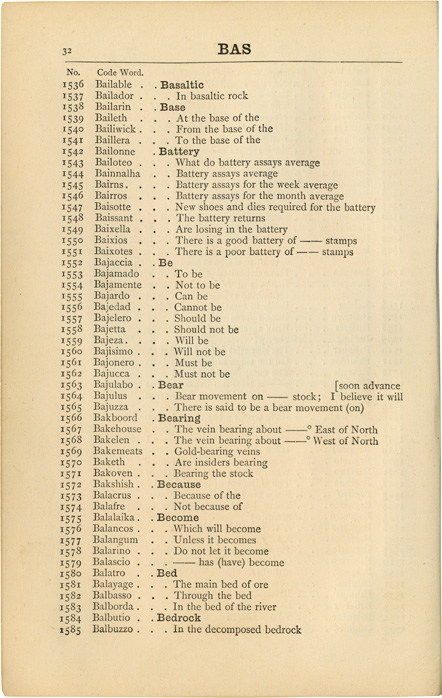 |
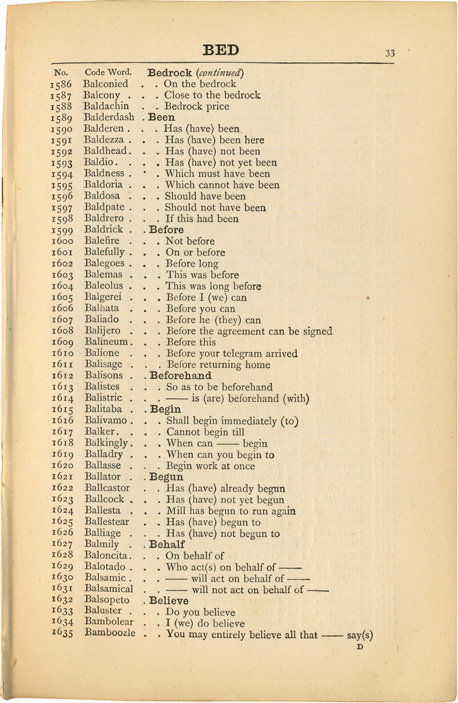 |
||
| pages 32 and 33 ex C. A. Moreing, Telegraphic Mining Code (1888) copy in private collection |
To be,
and Not to be.
| 1890 | The Universal Mining Code for the use of mining companies, mining engineers, merchants, agents, shippers, manufacturers, and all engaged or interested in mining affairs. | By James Stevens, M.E. and R. Sydney Corbett.
The code words specially selected to comply with the Telegraphic Convention Rules, by George Ager, LL.D. London, 1890. | BL 7104.dd.3. |
| Part I. General Phrases 1-154 (151-154 blanks) Part II. Machinery, Stores, Accessories, &c. 155-330 (328-330 blanks) Part III. Tables of Dimensions, Numerals, Prices, &c. 331-390 (389-390 blanks) Part IV. List of Makers and their Advertisements. 391-400 (makers, listed under categories e.g., Air Compressing Machinery, Asbestos, Belting. List of Advertisers 401-402 advertisements. 55 (unnumbered pages) available as pdf directly from BL; may need to search anew to display options (download pdf, or view via |
|||
Gives up in (general) phrases, what it gains in machinery/parts suited to manufacturers. Advertisements might have dated the code, immediately upon publication. From the preface —
The Code differs materially from other publications of a similar nature, in that it not only contains a comprehensive collection of phrases and general sentences specially applicable to mining affairs, but it also provides exceptional facilities for what may be considered of still greater importance and utility, viz: the transmission, by telegram, of orders for every description of machinery, stores, and accessories used in mining.
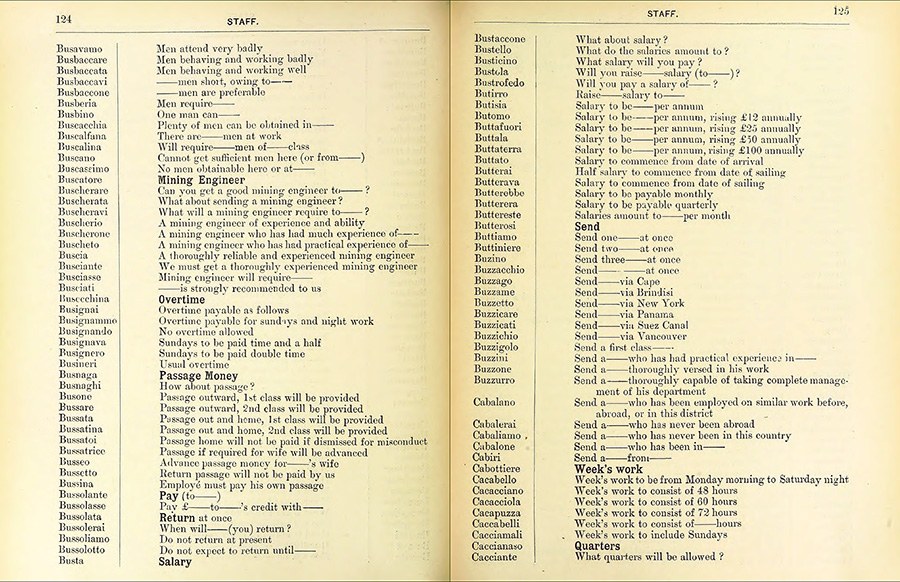 |
|
| pages 124-125, Stevens, Corbett, (Ager), Universal Mining Code (1890) ex BL scan |
|
Should compare these phrases, with comparable sections in Moreing, McNeill, et al.
| 1891 | New General and Mining Telegraph Code alphabetically arranged, for the use of mining companies, mining engineers, stockbrokers, financial agents, and trust and finance companies. | By C. Algernon Moreing and Thomas Neal; London: William Clowes and Sons, Limited, 1891 | archive.org UC Berkeley archive.org UC Berkeley (9th ed, 1905) NYPL (8th ed, 1901) |
The New General and Mining Telegraph Code / by C. Algernon Moreing, M.Inst. C.E., Mining Engineer, and Thomas Neal, Secretary of the Montana Company, Limited, and the Mines Company, Limited. Alphabetically Arranged, for the use of Mining Companies, Mining Engineers, Stockbrokers, Financial Agents, and Trust and Finance Companies.
1899. London : William Clowes & Sons, Limited. [numerous other publication locations]
Price One Guinea.
5 1/2 x 8 1/2 inches
[1-8, Contents
on p7]; vocabulary (1-597);
skeleton (598-612); English money (Sterling) (613); American money (624); Numbers (634); Feet and inches (639); Weights (640); Assays (642); Percentages (644); Dates (648); Letters (652); Cables (654);
Points of the compass [and phrases associated with NSEW in columns ] (656); Electric Lighting, etc. [for use in mines] (660); Bankers (662); Finance and Miscellaneous companies (665);
Skeleton Code for Addenda (666) [the latter not skeleton from 672 to end 676, but filled in with phrases associated with advertisers’ products [code, but not advertisements, reappear in the 1905 American reprint]
(Mostly) English/y dictionary codewords
29,011 Shuttlebox Do(es) not wish
29,012 Shwanpan When do you wish
29,013 Shyly I (we) do not wish
30,000 Spectrums [blank ; last numerated codeword]
1 / Aaaronic / Abandon
2 / Aaronsrod / Do not abandon >
Zygosos / Ask the Pulsometer Engineering Company, 63, Queen Victoria Street, E.C., to give you quotation for pumps suitable for work.
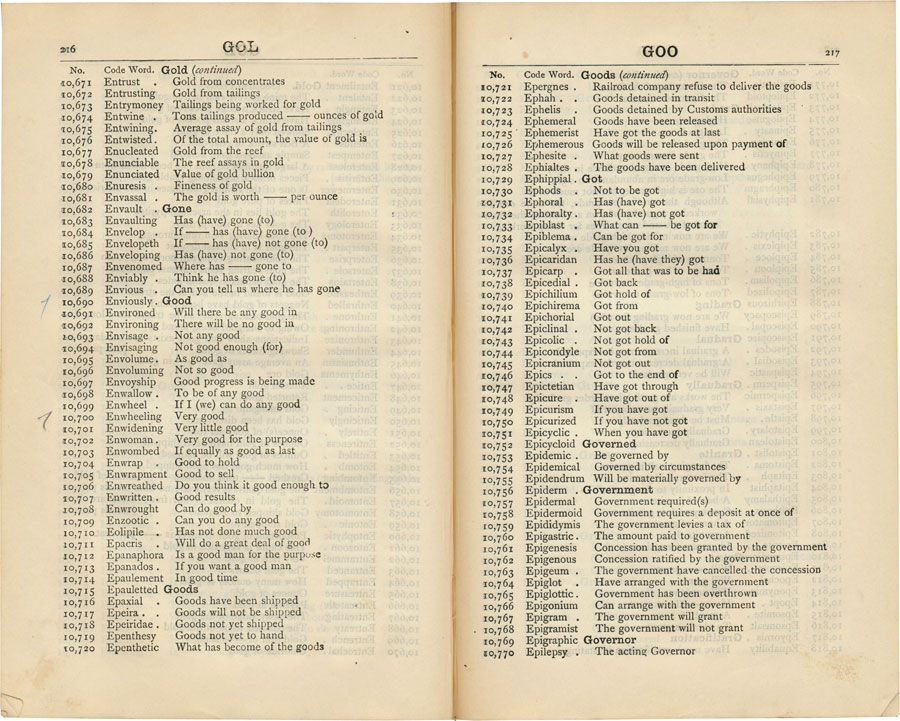 |
|
| pages 216-217, Moreing and Neal, The New General and Mining Telegraph Code (1891, this 1899 printing) in private collection |
|
Pencilled marks not my own.
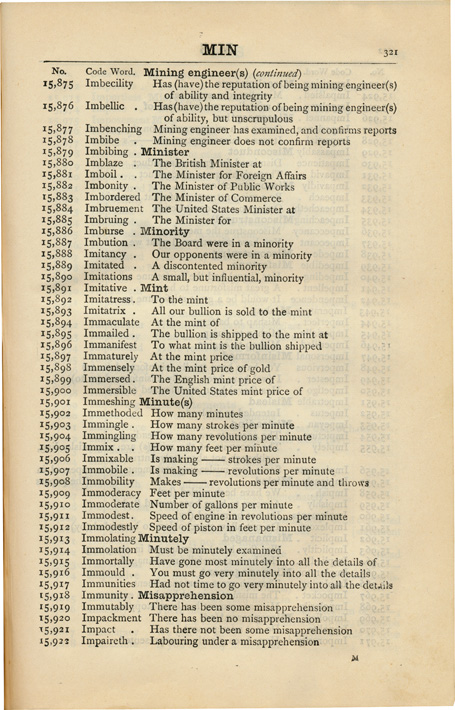 |
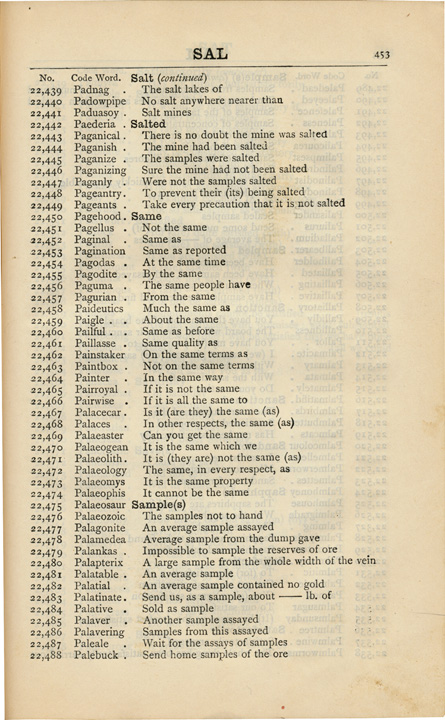 |
|
| pages 321 and 454 (not spread), Moreing and Neal, The New General and Mining Telegraph Code (1891, this 1899 printing) in private collection |
||
Interesting senses for salted.
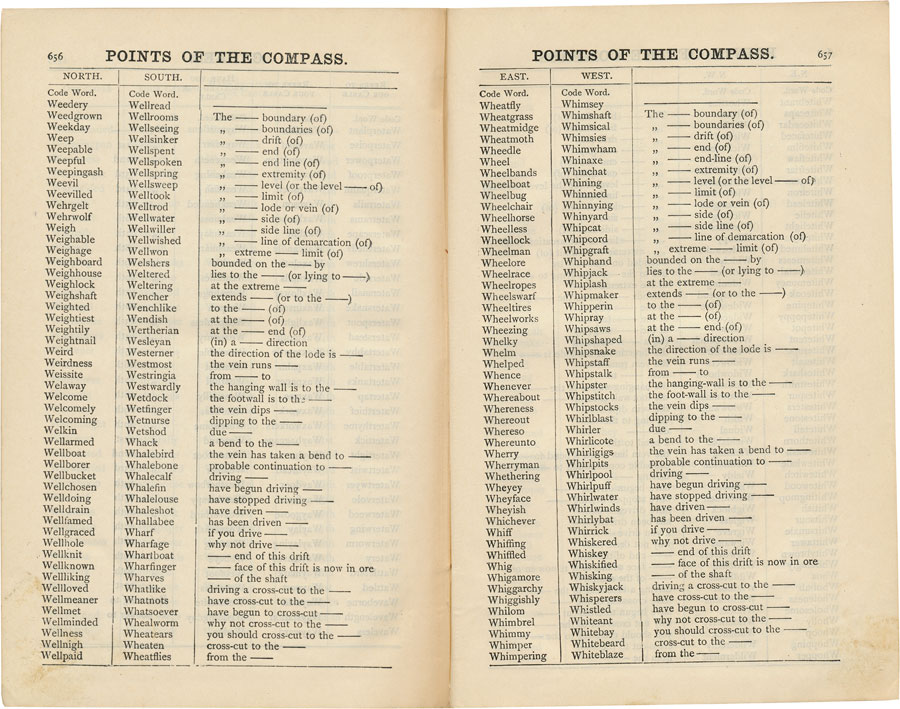 |
|
| pages 656-657, Moreing and Neal, The New General and Mining Telegraph Code (1891, this 1899 printing) in private collection |
|
Shown above, two of four pages of directional phrase tables.
Charles Algernon Moreing (1855-1942)
Moreing was Australian by birth and educated in England (including King’s College). He was taken on in 1874 by Thomas J. Bewick, an important mining engineer of the time. In 1885, he would go into partnership with Bewick to form Bewick Moreing Co.
During his earlier years with Bewick, Moreing was in charge of the foreign mining department of Sir Francis Bolton’s business.
The exposure Moreing would have had to Bolton’s own telegraphic codes is as interesting, in the present context, as is his experience with Bolton’s operations in Portugal, Algeria, France and Germany. Bolton’s Patent Code of 1868 and his Telegraph Code of 1871 are discussed here. The phrase sequences of the Bolton codes, incidentally, have much in common with F. G. McCutcheon’s codes — prompting curiosity about whether McCutcheon too may have worked for Bolton.
Moreing was involved in the Cornish mining industry, then suffering from competition and needing investment, but also further afield, including Western Australia’s goldfields. He is well known for hiring the young geologist Herbert Hoover, recent graduate of Stanford, and putting him in charge of operations at Kalgoorlie. When the son of Thomas J. Bewick retired from the firm, Moreing invited Hoover (and two others) to become partners. Hoover (and Moreing) were famously involved in the fortunes of the Chinese Engineering & Mining Company (a long story — involving the Boxer Rebellion — well told in Nash). Hoover and Moreing parted ways thereafter.
It is impossible to know the degree to which the codes bearing Moreing’s name were primarily his work, but the earlier exposure to Bolton suggests to me that he would have been quite familiar with their structure and usage. (Neal, as a secretary of mining concerns, would also have had practical experience with them.) The later and elaborate codes done in partnership with F. G. McCutcheon would likely have banked more on McCutcheon’s expertise and capacity to organize vast amounts of phrase matter in a systematic way.
Moreing contributed a number of letters to the editor of the London Times, and a series of essays in The Nineteenth Century presenting imperialist-tinged arguments for British development in — and construction of a trans-Asian railroad to — China: England’s Opportunity in China
(February 1898), A Recent Business Tour in China
(September 1898) : 386-399, and An All-British Railway to China
(September 1899) : 484-492.
sources —
Dictionary of Business Biography : A Biographical Dictionary of Business Leaders Active in Britain in the Period 1860-1980, vol. 4 (London, 1985)
The Dictionary derives some of its information on Moreing, particularly relating to Western Australia and China activities, from
George H. Nash his The Life of Herbert Hoover vol I The Mining Engineer 1874-1914 (New York, 1983).
| 1895 | McNeill’s Code. Arranged to meet the requirements of mining, metallurgical and civil engineers; directors of mining, smelting and other companies; bankers; stock and share brokers; solicitors, accountants, financiers and general merchants. Safety and Secrecy. | Bedford McNeill. New York: The American Code Company, 1895 | archive.org University of California HE7677 .M6M2 google books NYPL (reprint?) |
Must be later than the 1895 given on title page: an advertisement for Pieron’s Code Condenser (another American Code Co. title) mentions the ABC Code (fifth edition), which appeared in 1901). A Preface to Reprint
has been added to the introduction; it contains a list (of ten) corrections.
| 1899 | McNeill’s Code. Arranged to meet the requirements of mining, metallurgical and civil engineers; directors of mining, smelting and other companies; bankers; stock and share brokers; solicitors, accountants, financiers and general merchants. Safety and Secrecy. | Bedford McNeill. London: Printed and published by Whitehead, Morris & Col, Limited, 1899 | google Harvard / Cabot Eng 4348.99 |
i-viii, 1-807
6 x 9 1/2 inches
Part I (Alphabetical Code) :
Aalen 00001 / A; Aalfang 00002 / Abandon > Threepenny 44572 / Within the mineral zone
Part II
Survey of Mineral Properties includes a four-page table for details about mines (reports, pay attention to, etc.)
This section also contains four pages of five-column tables for letters and cables.
The rest of Part II is conventional columns for numbers, money, measurements, weights, banks, finance companies, etc., through Xenodochy 45123 / Wyldsdale Gold Exploration and Developing Co., Limited.
Concludes with blank code (substitutions and extra) through Zymotic 45767.
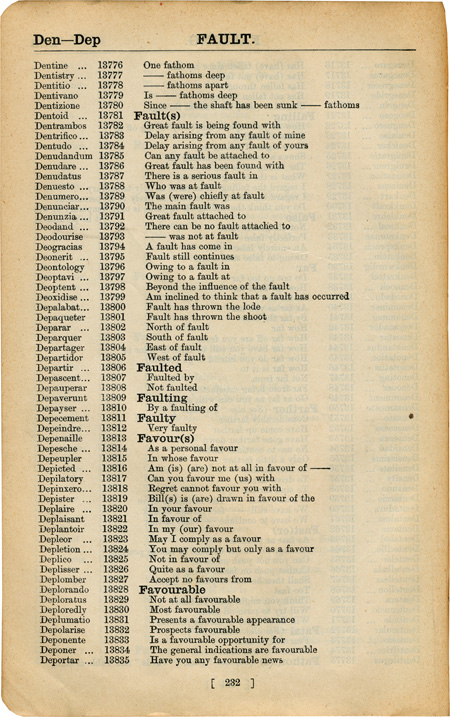 |
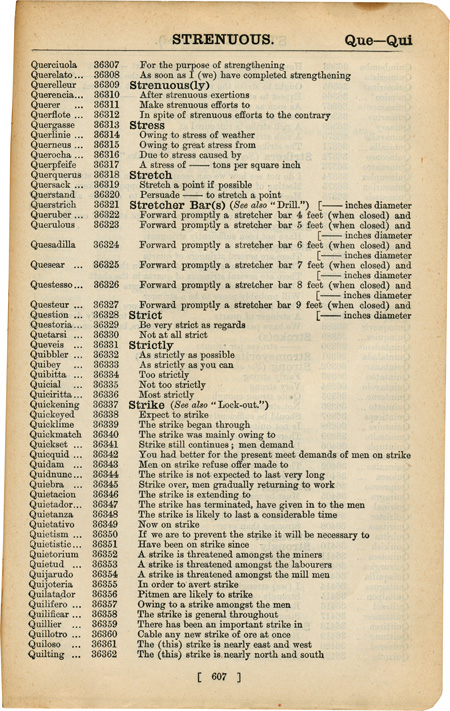 |
||
| pages 232 and 607 ex McNeill’s [Mining] Code (1907) copy in private collection |
Both fault
and strike
have double meanings in the mining context, and both senses are evidenced here.
| 1899 | Terminal Index for Use with McNeill’s Code. | mining | London: Whitehead, Morris & Co., 1899 | archive.org both UC Berkeley HE7677 .M6M23 |
First published 1895? So states an American Code Company reprint (in my collection).
A terminal index can aid identification of intended codeword, where letters in first part of a codeword are mutilated. See preface for explanation. Terminal indexes would be replaced by mutilation tables for 5L codewords, when those came into use within a decade after this.
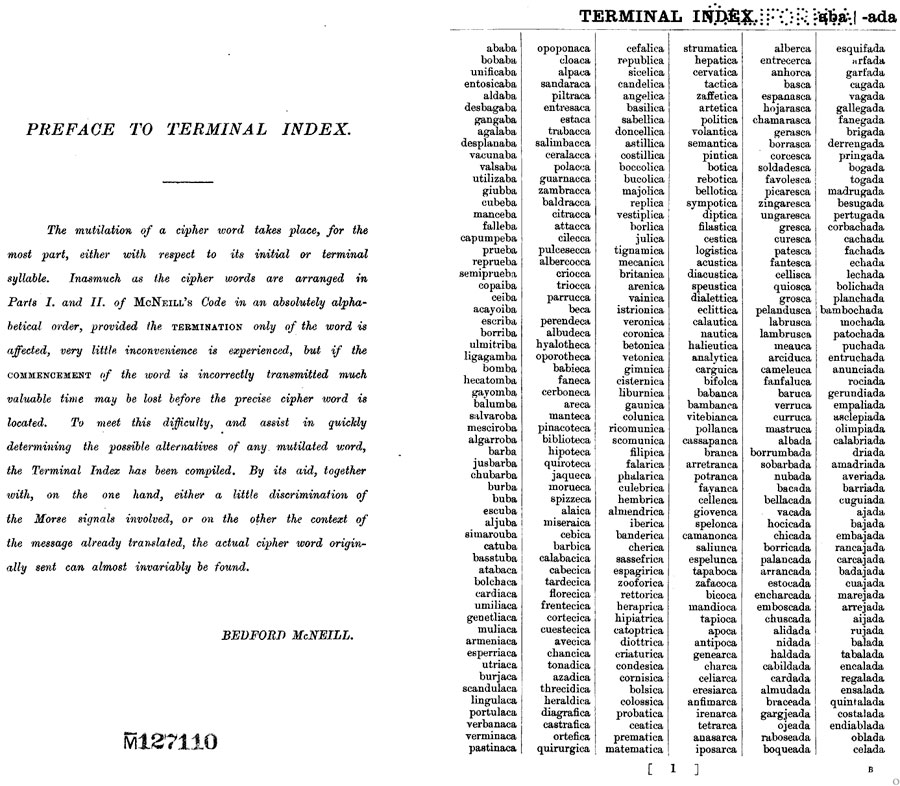 |
|
| preface and first page of Terminal Index for Use with McNeill’s Code (1899) (cropped and rearranged; not spread in original) |
|
Works much like a rhyming dictionary. See for example Walker’s Rhyming Dictionary, which went through many editions but whose late nineteenth-century editions offer instructions for its use in deciphering telegraphic errors, e.g., here, in the 1904 edition.
| 1900? | Private Mining and Metallurgical Telegraphic Cipher Code of the Canadian Pacific Railway | mining | Printed under the supervision of W. H. Aldridge. | Hathitrust / archive.org University of Alberta NW 652.8 C212p c.4 (from microfiche) |
catalogued as [Quebec? : s.n., between 1900 and 1910]
[private copy has two mentions of 1908 in holograph additions]
313pp
private (jm) copy no. 65. contains hand and typewritten additions; most of those additions are also present in Alberta scan, but not all (and vice versa)
Dictionary code words (all English), and all numbered:
Aback 00000 / Cent.
Shackle 13956 / blank
Classified phrases pages 1-184 (cents and fractions of a cent, dollars, mining districts, coal mining, machinery etc etc.) Miscellaneous phrases pp184-313
| 1904 | Clough’s mining code (Revised Edition, 1904) compiled expressly for the use of brokers in correspondence by telegraph | mining | New edition, revised and enlarged, 1896, C.F. Clough, 1896; Revised edition, 1904, Shaw & Borden Co., Spokane, Washington | Hathitrust / google University of California HE7677.M6 C56 1904 |
Code pp 5-62; followed by Part III Useful Notes for Miners and Others
pp65-124 (useful glossaries, punctuated by pages of advertisements and notices). Dictionary and artificial codewords, Abasal / Abbey Mining Co. (N. Mex.) through Quizzism / The twentieth to last. Phrase and glossary matter geared to needs of investors and promoters, rather than mining engineers, managers, owners. For example, the word strike
appears seven times in the code, but never in reference to labor action. Example: Harborer / The — — has made a big strike, prices of shares will advance.
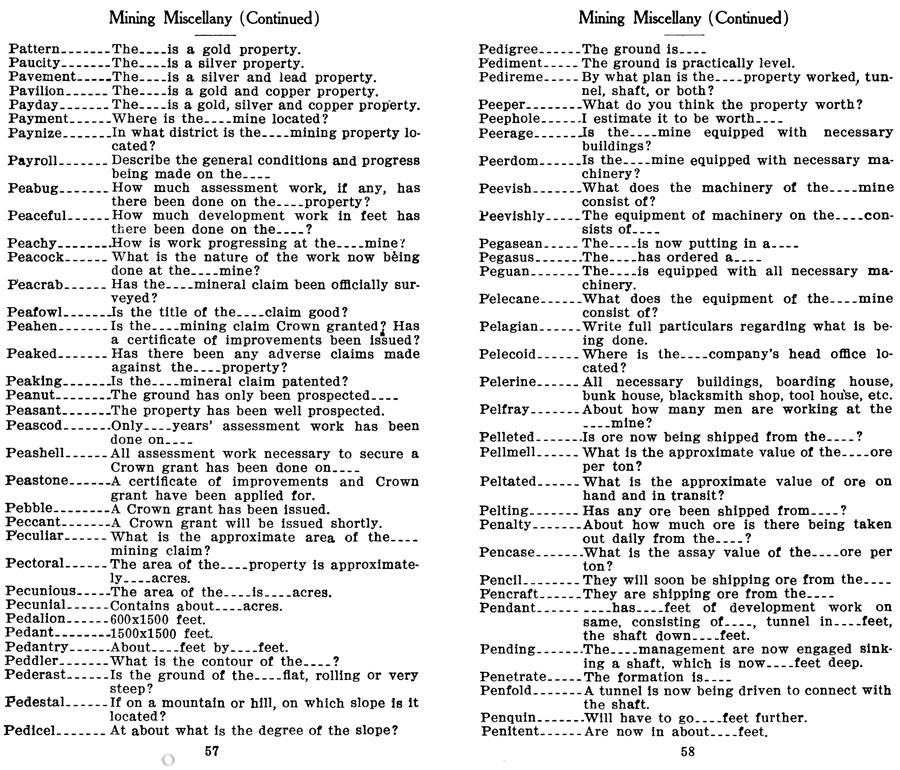 |
|
| p57-58, cropped &c. for this showing, Clough’s mining code (1904) | |
Phrases in section Mining Miscellany
(pp 54-60) weirdly package technical terms in baroque expressions, e.g., Pedicel / At about what is the degree of the slope?
.
| 1907 | Mining Supplement to Bentley’s Complete Phrase Code. | Published by E. L. Bentley, at 7, East India Avenue, London, E.C. | google Stanford 612.B477 |
32 (printed) pages, points to Bentley’s Complete Phrase Code for phrases relating to mining but having more general application too, e.g., accident
or adjoins.
Five-letter, wuvne / Adit has cut through zufop / Rich zone being worked at present, followed by 10 pages of blank code zufpo through zyzwo. All codewords begin with w, y or z
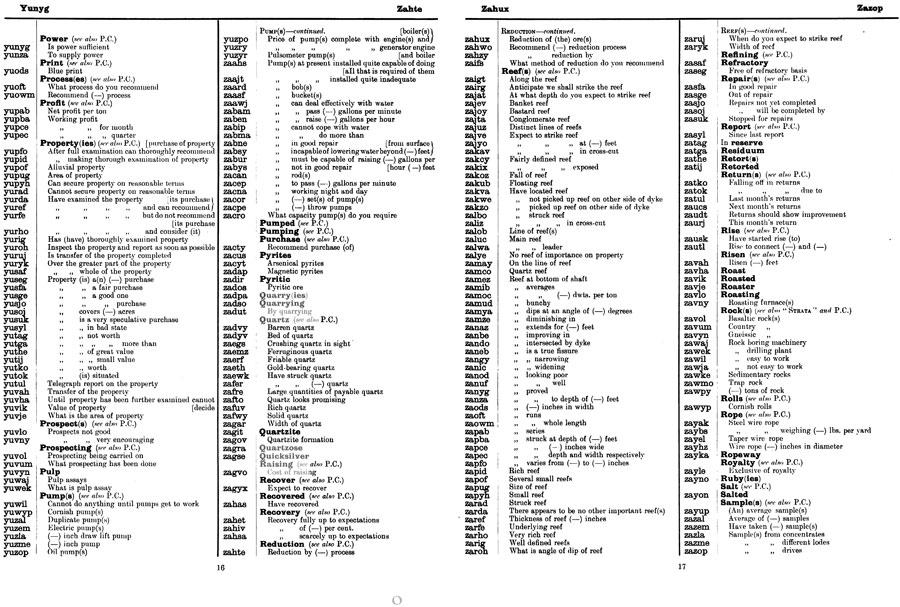 |
|
| pages 16-17 (cropped) ex Mining Supplement to Bentley’s Complete Phrase Code (1907) | |
All phrases — no tables.
Prepared with expert assistance to facilitate the transmission of mining telegrams and technical terms not adequately covered in the body of this book.
— this book
referring to the Complete Phrase Code itself. Two pages of specimen cables suggest the use of the Phrase Code and Mining Supplement together.
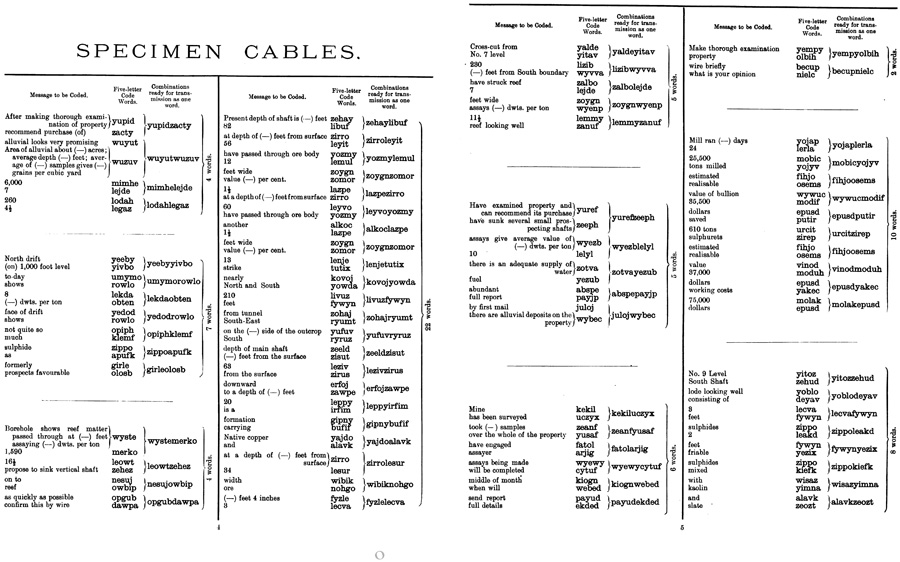 |
|
| pages 4-5 (cropped) ex Mining Supplement to Bentley’s Complete Phrase Code (1907) | |
| 1908 | McNeill’s Code (1908 Edition.) | London: Whitehead, Morris & Co., Ltd. New York: The Hill Publishing Company | google UC Berkeley HE7677 M6M2 1908 and private collection |
Much expanded from earlier edition — 105,192 entries, versus 44,572. Title page explains: No cipher word employed in McNeill’s Code (1908 Edition) appears in McNeill’s Code. The two codes can therefore be used quite independently.
General Suggestions for using...
i-xii
Morse signals, &c with some possible Substitutions of Omissions
xiii
the code proper, pages 1-1399 :
Aachenense 00001 / A
Aakschuit 00004 / Taken aback
—
Stampavate 105191 / When I (we) reach the mineralized zone
Stampelamt 105192 / Limit(s) of mineralized zone.
Terminal index page 1 through page 268.
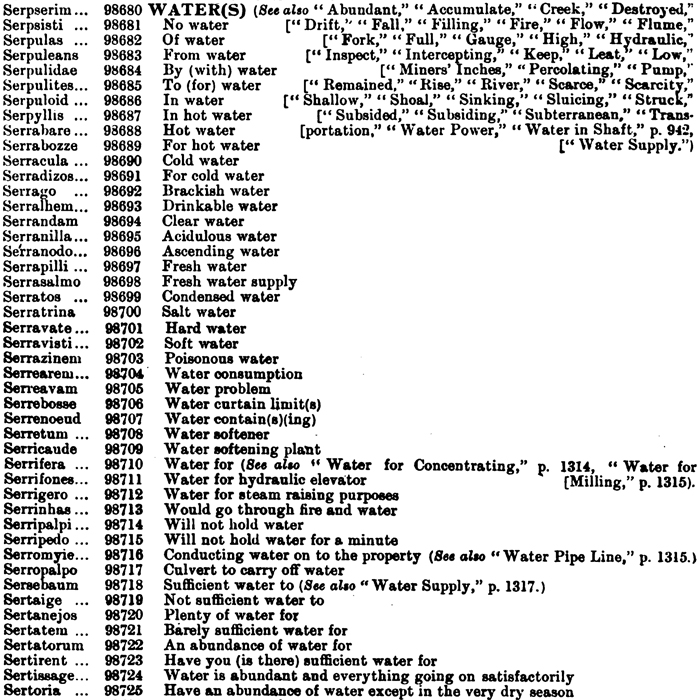 | ||
composite of waterphrases pp1312-1313, McNeill’s Code (1908 edition) |
||
Scan misses or only partially captures a couple of pages. Worse, the scan (or evidently the volume from which the scan was made), wants a Part II containing Tables. I believe — but have yet to confirm — that the tables are provided in a 248-page insert.
| 1908 | Miners’ & Smelters’ Telegraph Code adopted by The American Smelting & Refining Co. | Published by The Business Code Co. New York. E. & F. N. Spon, Ltd. 57 Haymarket, S. W. London printer: Wynkoop Hallenbeck Crawford Co., New York. | private collection |
This copy stamped no. 455
and loaned to Mr. Fred Hellmann (signature).
5 1/2 x 8 1/5 inches
i-iv, 1-464
Phrase Tables 1-20, General Phrases 21-408, Miscellaneous Tables, Etc, 409-432, Supplement 433
This copy includes supplement inserted between pages 20 and 21, all codewords beginning. phrases refer to mining, and even to specific mines, mining machinery parts,
at p433 is added a supplement page for pounds sterling, this is followed by Supplement of American Smelting & Refining Co. regarding their business, mines, offices, etc. which is thoroughly emended by hand and pasted inserts.
Includes a check
for telegrams at p 350
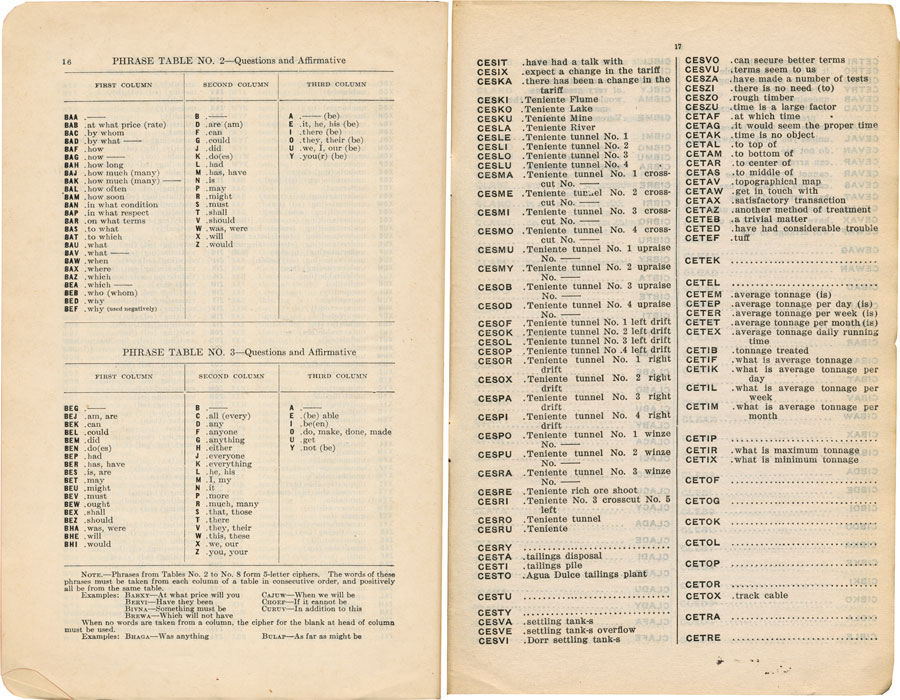 |
|
| page 16, and supplement page 17, (not spread), Miners’ & Smelters’ Telegraph Code (American Smelting & Refining Co., 1908) in private collection |
|
Shown at left above is one of eight flexible
phrase tables, whereby auxiliaries, various verbs (totalling 2,100) are joined to achieve desired phrase. The main virtues would seem to be space. Most of the verbs are also located throughout the code, minus the auxiliaries.
Flexible phrase tables are as found in other Business Code volumes.
At right is one page from a 20-page supplement pasted into the code, immediately following the phrase tables and preceding the General Phrases.
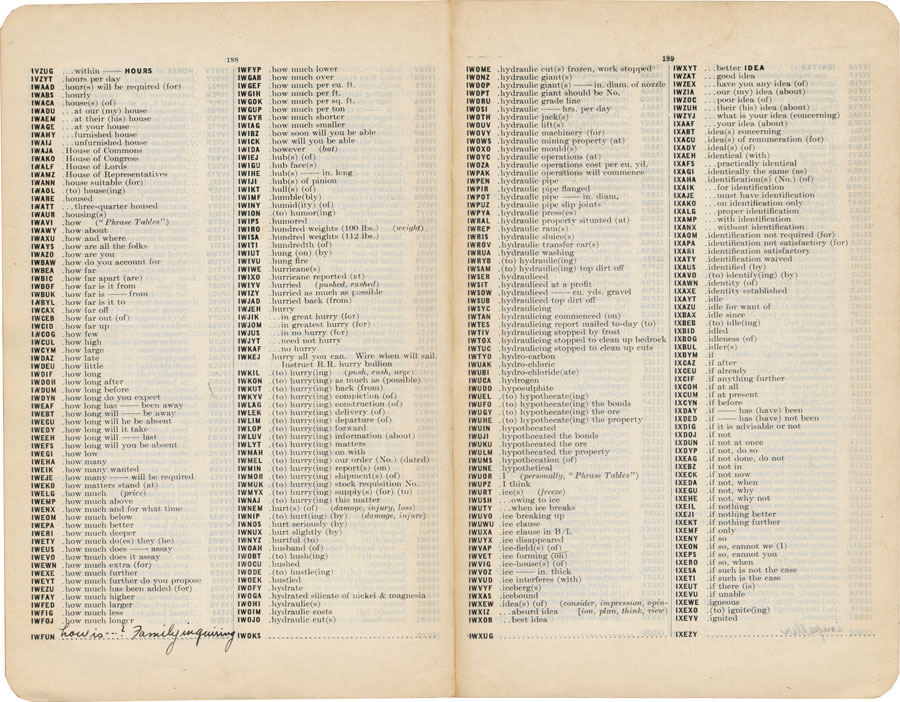 |
|
| pages 188-189, Miners’ & Smelters’ Telegraph Code (American Smelting & Refining Co., 1908) in private collection showing penned addition in blank code area. |
|
How far?, etc. The phrase offerings reflect the many unknowns in mining, versus commodities where classifications and other factors are finely tuned to known frequencies, as it were.
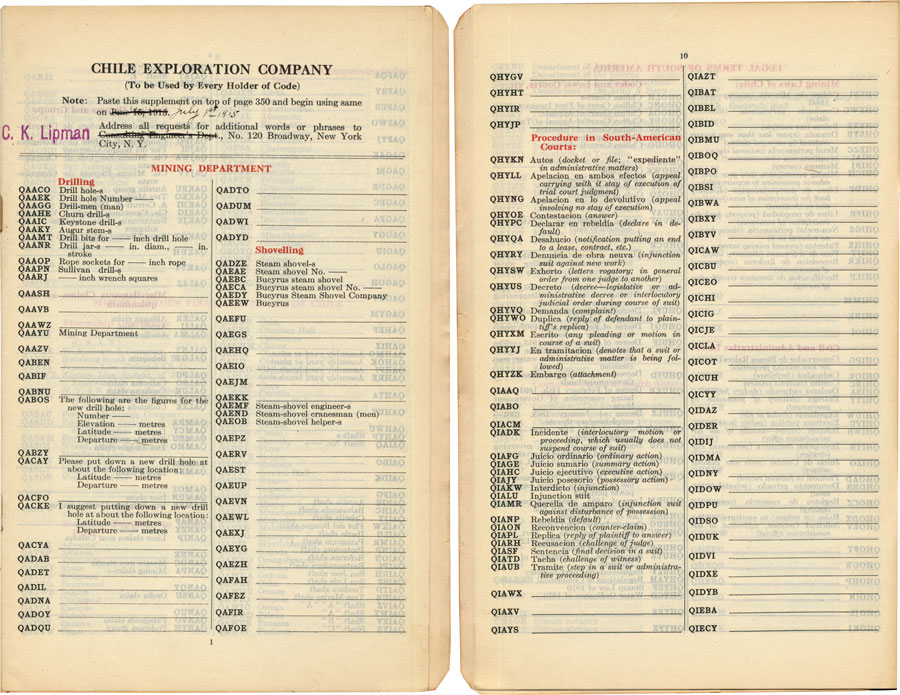 |
|
| pages 1 and 10 (not spread), Chile Exploration Company supplement, inserted between pages 350 and 351, Miners’ & Smelters’ Telegraph Code (American Smelting & Refining Co., 1908) in private collection |
|
The private edition clearly intended for use with South American mining operations.
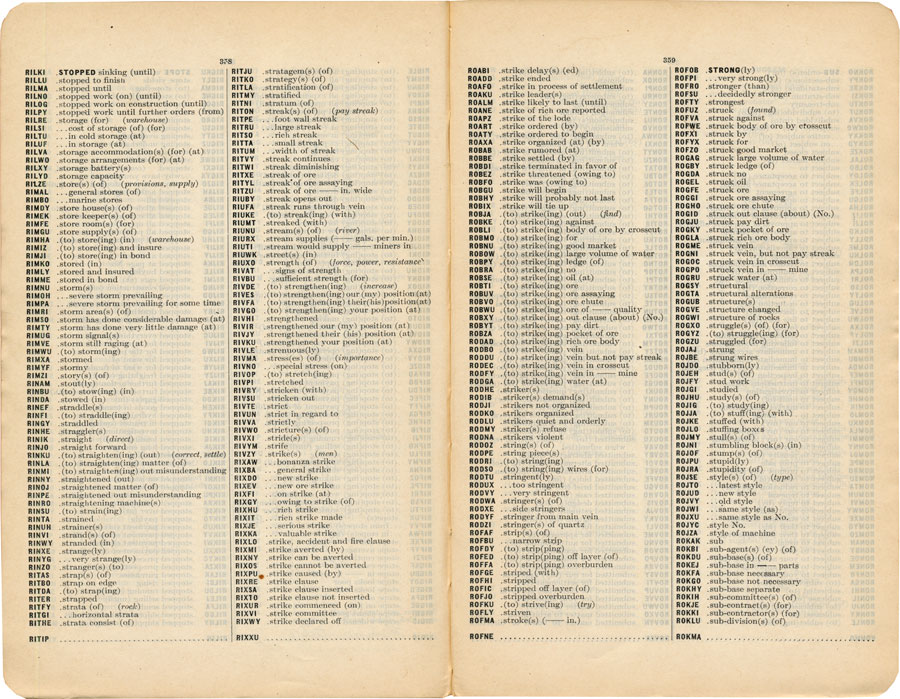 |
|
| pages 358-359, Miners’ & Smelters’ Telegraph Code (American Smelting & Refining Co., 1908) in private collection |
|
Note different senses for the word strike.
| 1908 | Cable Code Calumet and Hecla Mining Company. Second Edition. | no date or place. | private collection |
Cable Code
Calumet and Hecla Mining Company. Second Edition. Cable Address “Zoo Boston.”
1-145 (printed recto only; this copy one pasted addendum facing p 53, loose carbon sheets at pages 61 and 63 and some penned additions.
content strictly specifications, order and shipment particulars, nothing about labor management.
References A B C Code, Fourth Edition for use with occasional tables.
Code is printed with no title page, date or instructions other than what is on cover. It is intended purely for sales and shipping, and contains no phrase matter relating to management of mining operations, labor relations, etc.
Users would have been familiar with coding, and needed no instructions. The user of this particular copy added his/her own tabs.
Abacate / Budd Dillipiane & Co., Genoa
>
phrases begin at p 69 with
Waagdrager / We abandon the negotiation
> [following are a selection only]
Woebegone / We shall ship by steamer expected to sail
Woeful / We cannot ship before
Wrench / For stock at London
Wrenched / For stock at Hamburg
Wriggle / We have cabled orders for delivery from store (at)
Writeress / We cannot now decide whether to deliver from store
Writerling / We shall order delivery from store
Writership / Until we further instruct you please confine your sales to stock in store
Writhing / Ship Storehouse A,
Woolwich Arsenal —
Wronging / We have in store at
Wrongless / We have in store at New York —
Zalmrooker / Authority to seel 500 tons, October-November-December-January [authority to sell table]
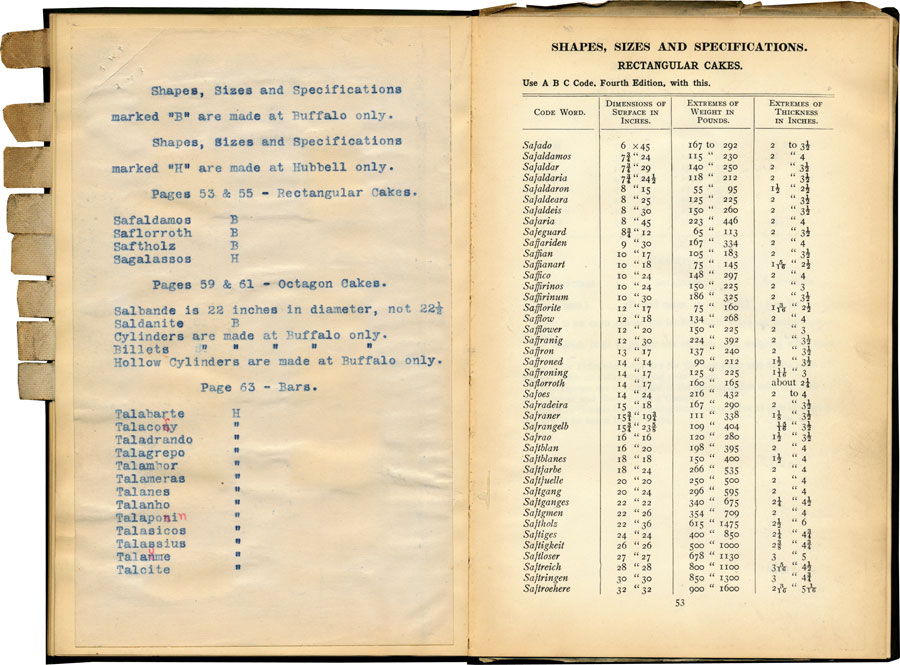 |
|
| page 53, facing addition pastedin, ex Calumet and Hecla Cable Code (1908) copy in private collection |
|
It is strange to see the fourth (1881) rather than the fifth (1901) edition of the ABC Code specified here and elsewhere in this 1908 code.
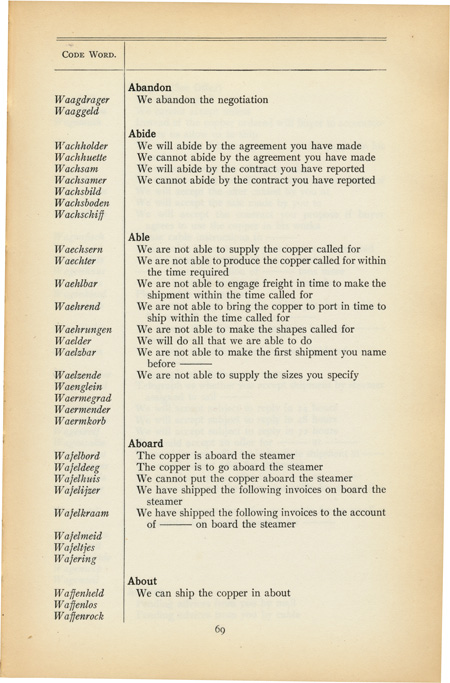 |
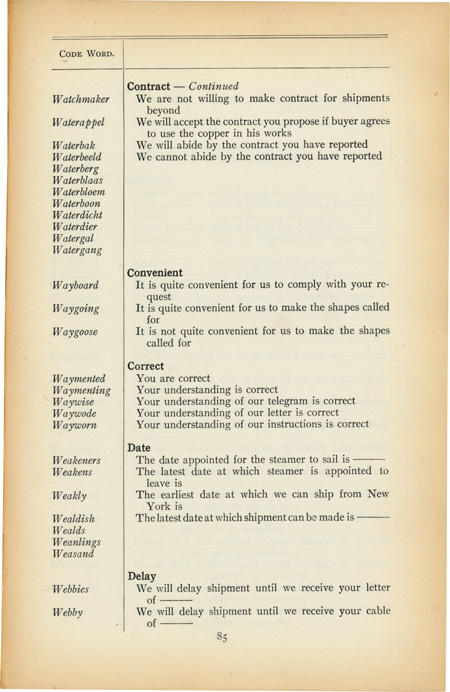 |
||
| pages 69 and 85 (not spread), ex Calumet and Hecla Cable Code (1908) copy in private collection |
Both pages from the phrase vocabulary, running pages 69 through 139, printed recto only.
Copper Mine Strike of 1913-1914
Images of actual (coded) telegrams, and typewritten plaintext translations. They are communications from late July 1913, until the end of the strike, between James MacNaughton, then Second Vice President of the Calumet and Hecla Mining Company (C & H), Quincy Shaw, the president of the company. The code used is not the sales/shipment cable code discussed immediately above.
This beautiful project was done by student participants in a Scientific and Technical Communication class at Michigan Technological University, in Houghton, Montana, in Fall 2000. The material is part of an archived Virtual Upper Peninsula
prototype. The Calumet and Hecla Mining Company was a major producer of copper in the late 19th and early 20th century.